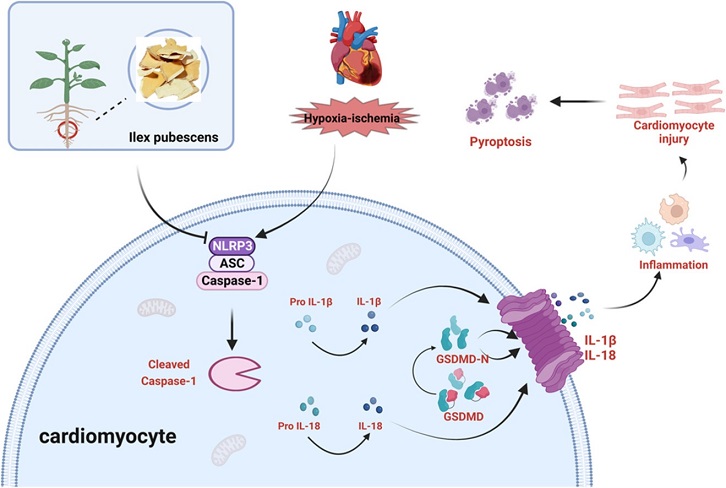Herbs And Phytochemicals: Ilex Pubescens Protects Heart After Myocardial Infarction
Nikhil Prasad Fact checked by:Thailand Medical News Team Jun 04, 2024 1 year, 7 months, 3 weeks, 6 days, 18 hours, 58 minutes ago
Herbs And Phytochemicals: In a significant breakthrough, researchers from the Institute of Integration of Traditional and Western Medicine at Guangzhou Medical University and the School of Chinese Medicine at Hong Kong Baptist University have unveiled a traditional Chinese herb, Ilex pubescens (IPES), that shows remarkable cardioprotective effects post-myocardial infarction (MI). This discovery opens new avenues for treating heart diseases with herbal remedies, specifically focusing on the inhibition of pyroptosis through the suppression of the ROS/NLRP3 pathway.
 Graphical Abstract - Ilex Pubescens Protects Heart After Myocardial Infarction
The Healing Power of Ilex Pubescens
Graphical Abstract - Ilex Pubescens Protects Heart After Myocardial Infarction
The Healing Power of Ilex Pubescens
Ilex pubescens, known in Chinese medicine as "Mao Dong Qing," has been used for centuries to treat various health conditions, particularly cardiovascular disorders. This herb, a member of the Aquifoliaceae family, is predominantly found in the subtropical and temperate regions of China. Its leaves, characterized by their bitter taste, have traditionally been used as a remedy for heart-related ailments.
The Study and Its Findings
The research team conducted an in-depth
Herbs And Phytochemicals study to investigate the potential cardioprotective effects of IPES on myocardial infarction in mice. The study aimed to elucidate the primary mechanism by which IPES inhibits pyroptosis - a form of programmed cell death characterized by the production of pro-inflammatory cytokines - post-MI.
Methods and Models
The study utilized a myocardial infarction model by ligating the left coronary artery in C57BL/6 mice to induce heart injury. Additionally, primary neonatal cardiomyocytes extracted from the hearts of Sprague-Dawley rats were treated in an oxygen-glucose deprivation way to establish pyroptosis in vitro. Various treatments, including ROS scavenger and NLRP3 inhibitor, were employed to confirm the inhibitory effects of IPES on myocardial pyroptosis through the ROS/NLRP3 pathway.
Significant Results
The in vivo experiments demonstrated that IPES significantly reduced heart injury, improved cardiac function, and decreased serum markers of cardiac damage. Notably, IPES treatment inhibited ROS generation and reduced the expression levels of NLRP3 and its downstream pyroptosis-related proteins. In vitro studies further supported these findings, showing that IPES therapy decreased cell damage and pyroptosis in a concentration-dependent manner.
Mechanisms at Play
The study revealed that IPES exerts its cardioprotective effects primarily by inhibiting the ROS/NLRP3 pathway. Reactive oxygen species (ROS) are known to exacerbate myocardial infarction by inducing oxidative stress, which activates the NLRP3 inflammasome - a multiprotein complex that triggers pyroptosis. By suppressing ROS generation and inhibiting the NLRP3 inflammasome, IPES effectively prevents pyroptosis and reduces myocardial damage.
&
lt;strong>Inhibiting Pyroptosis
Pyroptosis plays a critical role in the progression of myocardial infarction, contributing to inflammation and tissue damage. The study demonstrated that IPES significantly inhibited pyroptosis in MI mice by suppressing oxidative stress and reducing the levels of key pyroptosis markers, including IL-1β, IL-18, GSDMD, and GSDMD-N.
Comparative Analysis
The research compared the effects of IPES with those of the NLRP3 inhibitor MCC950. Both treatments showed similar protective effects against OGD/R-induced pyroptosis in cardiac cells, suggesting that IPES could act as a potential NLRP3 inhibitor. Additionally, the study explored the synergistic effects of IPES and NAC (a thiol-based antioxidant), further highlighting the herb's potent antioxidative properties.
Active Components and Molecular Interactions
Molecular docking studies identified several active compounds within IPES, such as (8Z)-Nuzhenide and Asiatic acid, which exhibited high affinity and stable binding with NLRP3. These findings underscore the robust interaction potential of these compounds with the NLRP3 hub gene, providing a scientific basis for the herb's anti-pyroptotic effects.
Discussion and Implications
The current study offers compelling evidence that IPES may serve as a promising therapeutic approach for treating myocardial infarction. By inhibiting the ROS/NLRP3 pathway, IPES demonstrates significant potential in reducing myocardial injury and improving cardiac function. This herbal remedy, with its rich history in traditional Chinese medicine, could pave the way for new, effective treatments for heart diseases.
Future Research
While the study provides a solid foundation for the cardioprotective effects of IPES, further research is necessary to explore its clinical applications and potential therapeutic benefits fully. Investigating the mechanistic pathways and bioactive compounds within IPES could lead to the development of novel treatments for myocardial infarction and other cardiovascular conditions.
Conclusion
In conclusion, the research highlights the remarkable cardioprotective properties of Ilex pubescens, a traditional Chinese herb, in treating myocardial infarction. By inhibiting the ROS/NLRP3 pathway, IPES offers a promising natural therapy for heart diseases, providing new insights into the potential applications of herbal medicine in modern healthcare. The study's findings underscore the importance of integrating traditional remedies with contemporary medical practices to develop effective treatments for life-threatening conditions like myocardial infarction.
The study findings were published in the peer reviewed journal: Pharmacological Research - Modern Chinese Medicine.
https://www.sciencedirect.com/science/article/pii/S2667142524000976
For the latest on
Herbs And Phytochemicals, keep on logging to Thailand Medical News.
Read Also:
https://www.thailandmedical.news/news/nutritional-support-reduces-inflammation-in-heart-failure-patients
https://www.thailandmedical.news/news/new-method-discovered-for-heart-cell-regeneration
https://www.thailandmedical.news/news/berry-good-for-the-heart-the-cardiovascular-benefits-of-cherries-and-berries
